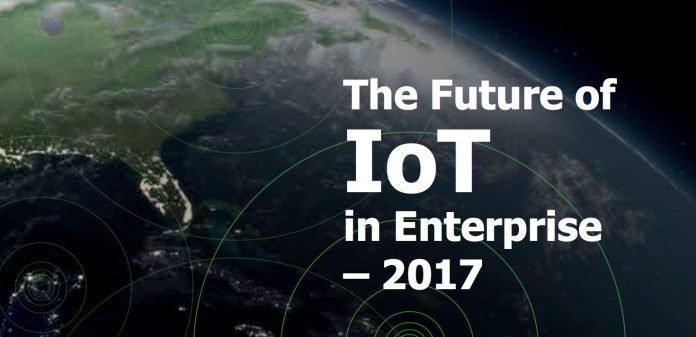It began with the invention of the steam engine in the late 16th century, and continued through the age of science (and mass production) to the more recent developments in digital technology. The industrial revolution has pushed the boundaries of imagination and possibilities, changing the way we move, work, live, and communicate. Now, a new revolution is upon us.
“It really will be a new age — a Fourth Industrial Revolution, where life for all of us will be nothing like what has gone before,” states Inmarsat, a provider of global mobile communications services. This fourth revolution builds on the digital era. Inmarsat points to advances in wireless connectivity, data storage capacity, and the Internet of Things (IoT) in a new report, entitled, “The Future of IoT in Enterprise – 2017.” It says IoT will transform some of our most important industries, such as agriculture and energy, and it has the data to prove it.
As part of the report, Inmarsat included data from Vanson Bourne (a technology market research group) that interviewed 500 respondents about their use of, attitude to, and predictions for IoT within their organizations. The results: 82% of industry respondents will adopt some form of IoT within the next two years.
In its research, Vanson Bourne considered four target industries: agritech, energy, mining, and transport. According to the findings, 21% of respondents (who are IoT-based decision-makers for their organization) say they’ve fully deployed IoT, and 33% have deployed at least some level of IoT-based solutions — and that percentage is expected to increase.
With IoT, objects with embedded sensors can communicate, analyze, and send data wirelessly. Just like your smartwatch can tell you the time and how many steps you took in a day, Enterprise Internet of Things (E-IoT) can track a company’s inventory, production, security, energy usage, and more. E-IoT can enable businesses to gather vital customer, product, and facility data in real-time, enhancing productivity and efficiency.
Predictive-based IoT analytics, for example, can help farmers estimate crop yields based on the data collected from the fields and micro-level environmental and weather conditions. Remote monitoring of offsite operations, such as for power plants or power lines, is also enabling more efficient energy systems with less downtime. Even IoT-connected road signs and traffic lights can manage traffic flow more safely and effectively.
The Internet of Things is enabling a new way of monitoring and managing operations. Inmarsat says IoT is “becoming the eyes and ears of the world around us,” radically changing workflow and industry. However, a more connected, IoT-driven world (and workplace) can also lead to a few challenges.
Here are three to watch for:
- Security. Three-quarters of the respondents from Vanson Bourne’s survey agreed that they needed to improve their processes to protect against malicious online and IoT-related attacks. What’s more is that just over half reported the need to reduce the risks of accidental misuse by employees. Unfortunately, time is of the essence. According to Inmarsat, the speed of IoT development makes it critical that the sectors surveyed review their approach to security and training to ensure a smooth and successful digital transition.
- Skills. Proper IoT integration and employee training takes skill. However, the IT skills needed to innovate and manage E-IoT and digital technology are in short supply. According to Inmarsat, there are employment shortages in the fields of data security, analytical data science, and technical support. Reliable network infrastructure providers who can work and train end-users in effective and secure IoT use and integration are in high demand.
- Connectivity. A common challenge for the industries surveyed is the remoteness of their operations. This is particularly true for the energy industry where an oil rig or wind farm may be hours or days away. But even in city areas, transport networks may struggle with reliable connections, which are integral to IoT-based solutions.
Despite these challenges, the fourth revolution is forcing organizations to be proactive, communicate, and learn new skills. Companies interested in the benefits IoT brings are working more collaboratively than ever, which is important if our key industries are to move successfully into the future.
Read Inmarsat’s full report Here:

